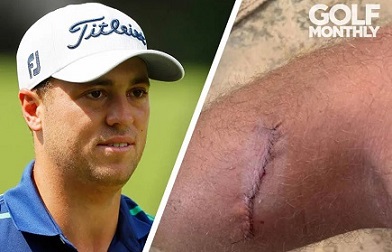Study Shows That Playing Golf Increases The Risk For Skin Cancer With Golfers In Australia Having At A 240% Increased Risk!
Nikhil Prasad Fact checked by:Thailand Medical News Team Oct 03, 2023 1 year, 6 months, 1 week, 3 days, 10 hours, 19 minutes ago
Skin Cancer: Golf, often hailed as a sport for all ages and backgrounds, offers a blend of physical activity, social interaction, and outdoor enjoyment. It is known for its many health benefits, including improved cardiovascular health, lung function, muscular strength, and mental well-being. However, a recent study conducted by the University of South Australia has revealed a concerning downside to this beloved pastime: golfers in Australia are at a significantly increased risk of developing
skin cancer. In fact, the study found that golfers in Australia have a 240% higher risk of skin cancer compared to the general population.
 In 2019, 10-time PGA Tour winner and professional golfer Justin Thomas
In 2019, 10-time PGA Tour winner and professional golfer Justin Thomas
revealed details of his melanoma scare after having a mole from the back of his leg removed.
https://www.golfmonthly.com/news/justin-thomas-reveals-details-of-melanoma-scare-186155
The study, the first of its kind to investigate the prevalence of skin cancer among Australian golfers, underscores the importance of prioritizing sun protection while enjoying this popular outdoor activity. Lead researcher Dr Brad Stenner emphasized the need for golfers to be "sun-smart" on the greens, highlighting that while golf provides numerous health benefits, the extended hours spent in the sun can contribute to a higher risk of skin cancer.
Skin Cancer: A Growing Concern in Australia
Skin cancer is a significant public health issue in Australia, where it accounts for the largest number of newly diagnosed cancers each year. Approximately 80% of all newly diagnosed cancers in the country are skin-related. Skin cancer encompasses both non-melanoma and melanoma skin cancers, with millions of cases reported globally each year. Alarmingly, skin cancer has claimed the lives of over 100,000 people worldwide due to excessive sun exposure.
The sun's ultraviolet (UV) radiation is a well-known risk factor for skin cancer. Prolonged exposure to UV radiation increases the likelihood of developing skin cancer later in life. While small amounts of UV radiation can stimulate the production of vitamin D, which is beneficial for the musculoskeletal system and overall well-being, excessive exposure can have harmful consequences.
Golf and Sun Exposure: A Risky Combination
Outdoor sports, by their nature, often entail prolonged sun exposure, sweating, inconsistent sunscreen application, and inadequate clothing protection. Golf is no exception, as it is played in natural, green outdoor environments where players may spend extended periods in direct sunlight. This risk is particularly pronounced in regions like Australia, the United States, and equatorial areas, where high UV radiation levels are prevalent, especially during certain seasons.
Unlike some outdoor sports where players have limited control over their attire, golfers can choose their cl
othing and accessories. However, studies from various countries have shown that commonly worn golf attire provides limited protection against UV radiation. Additionally, the adherence to skin protective behaviors, such as regular sunscreen application and wearing broad-brimmed hats, varies among golfers.
The Benefits and Risks of Golf: Striking a Balance
Regular participation in golf offers a range of health advantages, including improved cardiovascular health, lung and muscular function, strength, and overall quality of life. Unlike many sports, golf is accessible to people of all ages, making it a lifelong activity. However, the outdoor environment in which golf is played exposes participants to increased sun-related risks, including skin cancer.
While previous studies have suggested that golfers may be at a higher risk of skin cancer due to sun exposure, the University of South Australia's research represents a significant advancement in understanding this risk. This study is only the second to gather data on the history of skin cancer diagnosis among golf participants and the first to compare the prevalence of skin cancer in golfers to a general population group.
The Study's Findings
The study revealed that one in four golf participants (27%) had received a skin cancer diagnosis, compared to just 7% of the general population. After adjusting for factors such as age, sex, education, and smoking status, golfers were found to be 2.42 times more likely to report a skin cancer diagnosis than those in the general population.
These findings underscore the need for golf organizations, clubs, and facilities to inform players about the elevated risk of skin cancer and promote preventive strategies. Golfers are encouraged to use high Sun Protection Factor (SPF) sunscreen, regularly reapply sunscreen, wear protective clothing that covers high-exposure areas like arms, legs, neck, and ears, and opt for broad-brimmed hats instead of peaked caps.
Implications for Golf Participants
The study's results have important implications for golf participants, especially junior golfers who may be less aware of the risks associated with sun exposure. Golfers at high risk of skin cancer, including those with a family history of the disease or those on medication or undergoing treatment that increases UV sensitivity, should be particularly vigilant.
Furthermore, golfing tourists visiting sunny destinations like Australia should also be informed about the risks of excessive sun exposure and encouraged to take preventive measures.
In conclusion, while golf offers numerous physical and mental health benefits, the increased risk of skin cancer among golf participants, particularly in Australia, cannot be ignored. It is crucial for golfers to strike a balance between enjoying the game and protecting themselves from the harmful effects of prolonged sun exposure. By adopting sun-smart practices and staying informed about skin cancer risks, golfers can continue to enjoy this beloved sport while safeguarding their skin health.
The study findings were published in the peer reviewed journal: BMJ Open Sport & Exercise Medicine.
https://bmjopensem.bmj.com/content/9/3/e001597
For the latest on
Skin Cancer, keep on logging to Thailand Medical News
